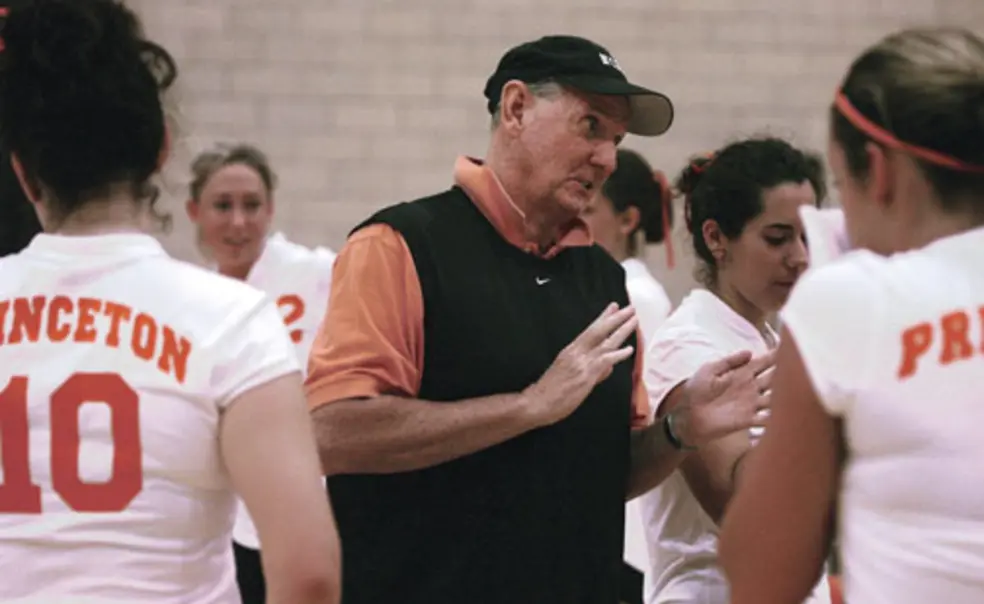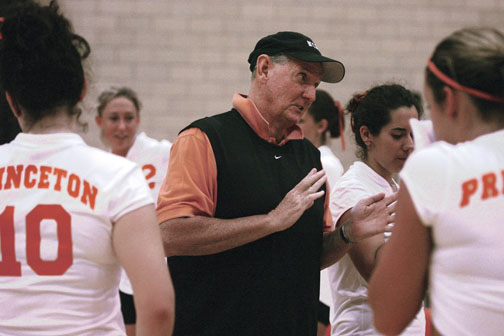On many nights, after silence descended on the courts of Dillon Gym, the lights remained on in one first-floor office facing Little Courtyard. Inside, students and coaches gathered to throw darts and trade heckles. The gatherings were called coach’s meetings. No RSVP required.
The coach in question, Glenn Nelson, has spent three decades presiding over two vanloads of self-described chicks and dudes, largely Californians, joined by a common ambition to play winning volleyball and shrug off the strictures of Ivy League life. Though many of them imagined that Nelson’s tenure would continue forever, Princeton’s volleyball family is bidding a reluctant farewell to its patriarch. In March, Nelson announced his retirement.
“The fact that I’ve coached both [the men’s and women’s teams] and have 58 seasons [29 years] under my belt ... maybe that makes me a little old before my time,” said Nelson, 59. “It’s been a blast, but it’s time to go.”
“Glenn and I have had a great run,” said Sabrina King ’01, a former Prince-ton player and Nelson’s assistant coach for the last six years. “Beyond the Ivy and EIVA [Eastern Intercollegiate Volleyball Association] wins, we have had lots of hilarious and memorable moments. ... He has been the heart of Princeton volleyball.”
Nelson has often attributed his success to just showing up. But there’s nothing so casual about Nelson’s final reckoning: He coached 11 Ivy women’s champions, including a 14–0 team last year. With the men, he spent the better part of the 1990s in the national rankings. In 1998, the men’s team won the EIVA championship and earned a trip to the NCAA Final Four.
Overall, Nelson has won more contests than any coach in Princeton athletics history — more than 1,100 matches — and he ranks in the top 25 in both wins and winning percentage in NCAA women’s history.
This year the women finished second in the Ivies and the men sixth in the seven-team EIVA Tait Division.
Having convinced many of his players to abandon the sands of California — reversing the journey that the New Jersey-born coach had taken when he went away for college — Nelson knew that to ignore either the sport’s distinctive culture or the challenges of a Princeton education would have made for woefully unhappy players.
“It takes a unique person to coach at Princeton because of the demands academically and socially,” Nelson said. “I’ve tried to keep in mind that [volleyball] was an extracurricular activity.”
With athletic acuity and wit to spare, Nelson favored levity over strict discipline and gave players license to motivate themselves. Despite his 11 women’s titles, Nelson coached only four Ivy Players of the Year, a testament to his emphasis on teamwork.
“The freedom, honesty, and trust that Glenn provided taught me everything I needed to know about being a leader and building camaraderie,” said David Newman ’96, now a technology manager for Target Corp. in Minneapolis.
Marin Gjaja ’91, who played on the reserve squad of the 1992 men’s U.S. Olympic team, said Nelson “gave me the confidence to believe that I could compete at the highest level.”
Such sentiments have translated into generous financial support for the men’s program, one of the University’s few “self-funded” varsity teams. Those donations ultimately are the result of a simple pitch that Nelson delivered to recruits: “You’ll have fun and you’ll win. See you in September.”
When alumni and current players heard that Nelson was contemplating retirement, they flooded athletic-department administrators with testimonials, trying to get the coach to rethink his decision.
Mark Nixon ’84, the chief operating officer of a furniture company in Los Angeles, said that “alumni players, loyal to the program and to Nelson, hope the next coach will have the same ability to coach both the men’s and women’s teams.”
Josh Stephens ’97 has covered Princeton volleyball since 1994.













No responses yet